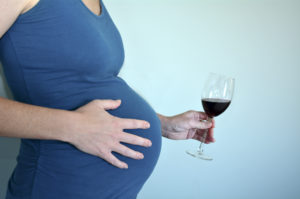 When you’re pregnant, everything you do and every choice you make impacts your unborn baby. That means that when you consume alcohol, your baby does too. Fetal alcohol syndrome can have a severe impact on your newborn and his or her ability to develop into a healthy infant. In the worst case scenario, the consequences could be fatal. Whether you drink only on occasion, daily, or know that you have a substance abuse addiction, all women who are pregnant or could become pregnant need to understand the causes and risks of this dangerous condition.
When you’re pregnant, everything you do and every choice you make impacts your unborn baby. That means that when you consume alcohol, your baby does too. Fetal alcohol syndrome can have a severe impact on your newborn and his or her ability to develop into a healthy infant. In the worst case scenario, the consequences could be fatal. Whether you drink only on occasion, daily, or know that you have a substance abuse addiction, all women who are pregnant or could become pregnant need to understand the causes and risks of this dangerous condition.
What is Fetal Alcohol Syndrome?
Fetal alcohol syndrome is a condition that impacts newborns that are exposed to alcohol during the mother’s pregnancy.
Causes of Fetal Alcohol Syndrome
Consuming alcohol while pregnant is the cause of fetal alcohol syndrome. When pregnant, alcohol enters the bloodstream and travels to the developing fetus via the placenta. For a fetus with a slower ability to metabolize alcohol, the exposure results in higher blood alcohol concentrations compared to an adult that can negatively impact the fetus’ delivery of oxygen and nutrition. It can also affect the healthy development of organs and tissues. While there is no defined quantity of alcohol that is considered the tipping point at which a baby will suffer the negative consequences of fetal alcohol syndrome, the more a pregnant mother drinks while pregnant, the higher the risk to her baby.
What are the Symptoms of Fetal Alcohol Syndrome?
Fetal alcohol syndrome can cause physical, emotional, and developmental issues and brain damage to a newborn. Issues may include:
- Distinctive facial features such as a small head, small eyes, a short, upturned nose, a thin upper lip, and a smooth area between the nose and upper lip.
- Deformities of the limbs, joints, and fingers.
- Slowed physical development before and after birth.
- An undersized brain.
- Visual or auditory impairments.
- Heart defects.
- Problems with kidneys.
- Poor social skills.
- Difficulty getting along with others.
- Trouble adapting to change.
- Difficulties staying on task.
- Problems with behavior and impulse control.
- Difficulty with time management.
- Cognitive and central nervous system issues such as:
- Poor balance and coordination.
- Poor memory.
- Intellectual disabilities such as learning disorders or delayed development.
- Poor attention span.
- Difficulty processing information, problem solving, and reasoning and judgment.
- Hyperactivity.
- Mood swings.
The severity of such physical and behavioral issues may vary significantly among children diagnosed with fetal alcohol syndrome, but none of these defects are reversible as the child ages.
There is no amount of alcohol that is considered safe to consume while pregnant. If you are pregnant or hoping to become pregnant and are struggling to eliminate alcohol consumption from your daily life, talk to your OBGYN. He or she can provide you with the support and resources needed to make positive lifestyle changes that will protect your baby and give him or her the best chance for a healthy life.
More
 Overconsumption of alcohol or drugs can have potentially life-threatening consequences. Taking those risks for yourself is dangerous enough, but taking those risks on behalf of your unborn baby means a threat to both of your lives. Use of alcohol or illegal drugs during pregnancy puts your baby at risk of miscarriage, low birth weight, premature labor, placental abruption, and even death.
Overconsumption of alcohol or drugs can have potentially life-threatening consequences. Taking those risks for yourself is dangerous enough, but taking those risks on behalf of your unborn baby means a threat to both of your lives. Use of alcohol or illegal drugs during pregnancy puts your baby at risk of miscarriage, low birth weight, premature labor, placental abruption, and even death.
You likely know that women are not supposed to drink or consume drugs while pregnant, but it’s time to learn the details. What follows are the risks associated with drinking, smoking tobacco, or using three common illicit drugs, while pregnant.
Alcohol
When women consume alcohol while pregnant, it can negatively affect the growth of the baby’s brain and spinal cord cells. Depending on how much alcohol the baby was exposed to in the womb, he or she may suffer from fetal alcohol spectrum disorder (FASD). Mild to severe FASD health complications may include physical developmental disorders or other birth defects, or learning and behavioral issues. In the most severe cases, heavy alcohol use during pregnancy can lead to preterm labor, miscarriage, or stillbirth.
Tobacco
Tobacco products contain chemicals that are dangerous to you and your baby, including nicotine, carbon monoxide, and tar. According to the U. S. Centers for Disease Control and Prevention (CDC), these chemicals increase the risk of both miscarriage and stillbirth. Other health risks may include problems with the placenta or slow fetal development, two factors that can also cause a miscarriage or stillbirth.
Marijuana
Like cigarette smoke, marijuana contains toxins that can impede your baby’s ability to get the necessary amount of oxygen needed to develop properly. Marijuana puts your baby at risk of miscarriage, premature birth, low birth weight, and other developmental or behavioral problems.
Heroin
Heroin is extremely addictive. Babies exposed to heroin while in the womb may develop a dependency on the drug themselves. Upon birth, such babies are born suffering from such withdrawal symptoms as convulsions, fever, irritability, and sleep abnormalities. Babies born to mothers who use heroin are also at greater risk of a preterm birth, low birth weight, low blood sugar, breathing difficulties, bleeding within the brain, and even fetal death.
Cocaine
According to the American Congress of Obstetricians and Gynecology (ACOG), pregnant mothers who use cocaine have a 25 percent increased chance of premature labor, and babies born to women who have used cocaine while pregnant have a higher risk of being born with a physical birth defect. According to an inpatient treatment center, like other drugs consumed during pregnancy, cocaine can cross the placenta and enter your baby’s circulatory system. Your baby won’t be able to process and eliminate cocaine as quickly as you can, which can complicate your baby’s health risks.
If you consume cocaine early in your pregnancy, it may increase the risk of a miscarriage. If your baby is exposed to cocaine later in your pregnancy, your baby could be at risk of being born with a birth defect, or could face placental abruption, a condition that occurs when the placenta peels away, either partially or completely, from the inner wall of the uterus. Placental abruption could lead to severe bleeding, premature birth, or even fetal death.
Babies exposed to cocaine later in pregnancy may also be born with a dependency, and may suffer from withdrawal symptoms such as sleeplessness, muscle spasms, feeding difficulties, and tremors.
Getting Help
Whether you are already pregnant or looking to become pregnant, if you regularly drink or utilize recreational drugs today, know that it’s never too late to quit. Every day that you choose to live drug and alcohol-free is a day you choose a healthier life for you and your baby.
You don’t have to go it alone — please talk with your doctor today. He or she can help you get on the path to recovery and a healthy life ahead.
More
 When you’re pregnant, everything you do and every choice you make impacts your unborn baby. That means that when you consume alcohol, your baby does too. Fetal alcohol syndrome can have a severe impact on your newborn and his or her ability to develop into a healthy infant. In the worst case scenario, the consequences could be fatal. Whether you drink only on occasion, daily, or know that you have a substance abuse addiction, all women who are pregnant or could become pregnant need to understand the causes and risks of this dangerous condition.
When you’re pregnant, everything you do and every choice you make impacts your unborn baby. That means that when you consume alcohol, your baby does too. Fetal alcohol syndrome can have a severe impact on your newborn and his or her ability to develop into a healthy infant. In the worst case scenario, the consequences could be fatal. Whether you drink only on occasion, daily, or know that you have a substance abuse addiction, all women who are pregnant or could become pregnant need to understand the causes and risks of this dangerous condition.
